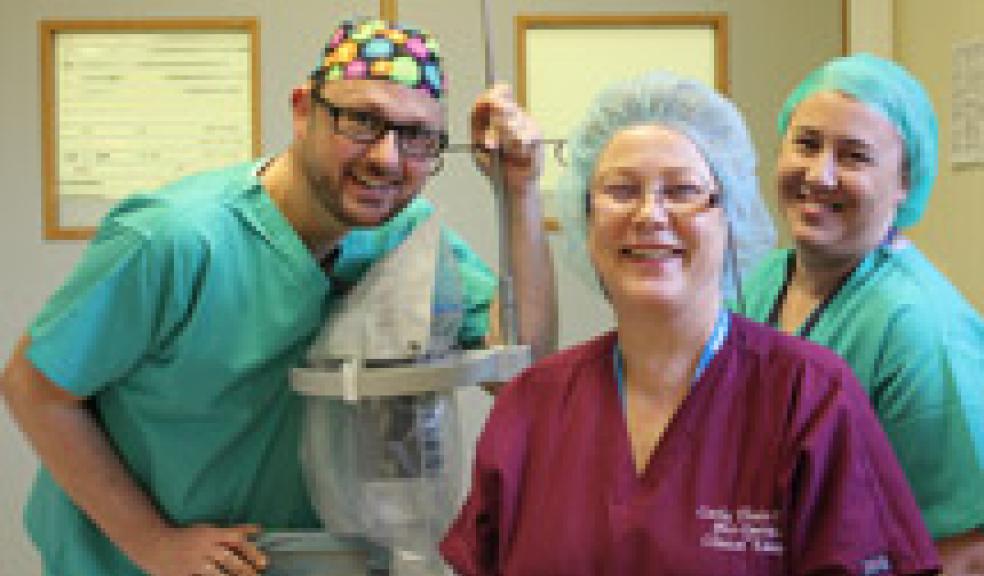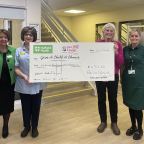
Blood salvage technique a success at Derriford
A blood conservation project for people undergoing operations is being rolled out across Plymouth Hospitals NHS Trust because of benefits to patients as well as cost savings.
The cell salvage project has been running since 2008 with proven health benefits to patients and cost benefits for our Trust. It involves collecting and reusing blood that a patient loses during a procedure.
Cathy Thuis-Harris, one of the Perioperative Clinical Educators, explained: “Previously, if patients lost blood during procedures, it was wasted and the patient would potentially have to receive donated blood. Now there is a machine that can collect and clean blood so it can then be put back in to the patient.”
Cathy is now focussing on the roll out of cell salvage, which was originally only used in vascular surgery, across the whole Trust.
She added: We are now really focussing on training as many staff as possible in order to ensure our patients obtain maximum benefit. We have also been fortunate in obtaining funding from the Trust’s Charities Committee to purchase several trollies which will be used to accompany the CS Machine in order to store sundries and act as a workstation. They will be a valuable addition to support this service.”
Figures show that, between 2013 and 2015, the number of cell salvage cases significantly increased from 281 to 721 and that increase is predicted to continue in 2016. This means that in 2015 our Trust potentially avoided using 518 bags of donated red blood cells, simply by using more cell salvage.
Daryl Thorp-Jones is Plymouth Hospitals NHS Trust Cell Salvage and Blood Conservation Lead and represents its development at Hospital Transfusion Committee meetings and regionally.
He said: “Blood conservation projects such as cell salvage most importantly protect our patients from harm caused by the ill effects associated with normal transfusion but also has been shown year on year (since 2008) to save our Trust money.
“What Cathy has done is driven the use of the technology into areas of surgery associated with more moderate or more gradual blood loss or where people were unfamiliar with the technology – for instance in orthopaedics, neurosurgery and upper GI and colorectal.
“Because the level of use is lower in these areas training, ease of use and competency assessment becomes harder to maintain without a dedicated member of staff like Cathy. However the benefits cannot be underestimated. The most recent NICE guidelines indicate that cell salvage has an essential role in moderate to severe blood loss. Cathy’s, invaluable role maintains this excellent, cost-effective care, and allows the technology to continue to be available as we aim for 24/7 coverage in all specialties.”
Mr Himanshu Sharma, Consultant Orthopaedic Spinal Surgeon, recognises the benefits of cell salvage and uses it during procedures.
He said: “Complex spinal procedures like lumbar instrumented fusions, major spinal trauma and spine tumour reconstructions are quite lengthy procedures and usually associated with significant amount of blood loss. Every third of these patients needed donated blood transfusions, (as per a service evaluation project on my patients in 2014). The good news is that with increasing use of cell salvage in such cases, the incidence of blood transfusion is considerably reduced. Our plan is to re-audit in 2016.
“Cathy has been pivotal in organising cell salvage facilities for all possible complex cases as well as co-ordinating, training and transferring skills to the suitable theatre staff as and when possible so that more trained staff are available to run this service in theatres smoothly. With Cathy’s pro-active involvement and the Trust’s directions, these patients are now benefitting from re-infusion of their own lost blood. Obviously, the risks attached with donated blood transfusion are eliminated as a bonus.”
The cell salvage technology will be on display in theatres during our Trust Open Day on March 19.













